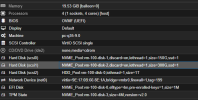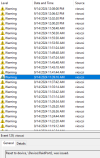i did it in the following steps
1. install new/old (when downgrading) driver by installiung the inf
2. search all the drivers
pnputil /enum-drivers
That gave me following output (its german, sorry for that)
Code:
Veröffentlichter Name: oem15.inf
Originalname: vioscsi.inf
Anbietername: Red Hat, Inc.
Klassenname: Speichercontroller
Klassen-GUID: {4d36e97b-e325-11ce-bfc1-08002be10318}
Treiberversion: 08/30/2021 100.85.104.20800
Name des Signaturgebers: Microsoft Windows Hardware Compatibility Publisher
Veröffentlichter Name: oem0.inf
Originalname: vioscsi.inf
Anbietername: Red Hat, Inc.
Klassenname: Speichercontroller
Klassen-GUID: {4d36e97b-e325-11ce-bfc1-08002be10318}
Treiberversion: 07/21/2023 100.93.104.24000
Name des Signaturgebers: Microsoft Windows Hardware Compatibility Publisher
3. uninstalled the "unwanted" with
pnputil /delete-driver oemXYZ.inf /uninstall
4. at that point the devicemanager already had the other driver present
4. reboot
Basicly Windows can hold multiple versions of one driver, that could be the problem for you



